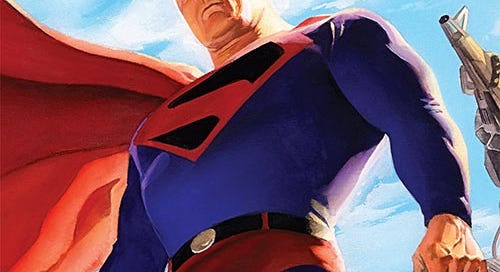So as I go through probably my last comics I can borrow from Hoopla here in Souderton, I finally got the chance to read Avengers Twilight. Probably the best thing I’ve read all month. But I keep hearing how it’s the equivalent to the classic DC story Kingdom Come. I can definitely see similarities beyond the Alex Ross covers. Especially since the best comparisons are not because they’re carbon copies.
Like any good art these can be up for interpretation so take my takes with a grain of salt.
The Skeleton
Both series deal with themes of generational divide. Usually in the form of the public turning against heroes for how they dealt with criminals. But in the fight to reestablish themselves, the old guard comes face-to-face with the effects of cutting themselves off from the world. Because to the public, they just can’t tell the difference between heroes and villains anymore. Worse yet, villains take advantage of this to get power in the shadows. Often using some heroes as pawns in their agendas. So a boy scout goes out to set things straight.
Kingdom Come: An Anti-Injustice
Kingdom Come was a masterwork of looking at the superhero genre. It is a commentary on classic superheroes trying to help the downtrodden and the more violent antiheroes that came to define the 80s and 90s. Rather than simpler, pulpier, adventures that glimpse into darkest hours, those darkest hours are now the point.
Anti (Comic Pathetic) Hero
For these characters represented by Magog, violence, the weapons they use (especially guns), their scars, and bad attitudes represent the fantasies of how a normally powerless person would escape from it. Basically selling the idea of security through training and firepower against the worst offenders of the world. It was easy starting with unrepentant mass murderers.
But when this became the default state, some of these heroes would shoot at lesser offenses like refugees entering illegally after much strife. Some even started fighting each other because they ran out of villains to kill. All while endangering people around them with their showboating. So they were locked up like other crooks.
Old Fashioned Inflexibility
The classic heroes side of Kingdom Come were an outright rejection of these grim-and-gritty takes on heroism. Superman especially even after losing everything never became like the Injustice character decades later. He was that dedicated to leading by example even though it was flawed.
But that was part of a bigger problem; the lower moral bar was because Superman went into isolation. He even gave up the name Clark Kent because he didn’t want to be a part of this new violent world. The same is partly true for Wonder Woman, who was kicked out of her home after getting blamed for the state of the world with Supes. So when Magog’s crew make the Midwest uninhabitable, Diana has to be the one to remind Superman of something better.
Then there’s how this absence affected people. Without Superman’s moral compass, Wonder Woman was affected by the antiheroes violent actions in addition to being cut off from Themyscira, becoming more militant in reaction to her mother’s last words to her. Batman meanwhile has become a middle ground with old and new. He resents his former friend Superman for hiding, agreeing with some newblood heroes that the old guard would rather turn away than face flaws in their ideals. Because Batman ran himself ragged, needing to replace his efforts with drones and an exoskeleton. Hence why Gotham has become more of a police state and his Outsiders have newbloods and classic heroes.
Humanity and Power
As for everybody else, villains formed a group branded as pro-normal people. But they’re really just taking advantage of civilians starting to mistrust superpowers since both the classics and newbloods didn’t turn out right. So bad that the UN dropped nukes to get rid of them all because they were afraid something bad was going to happen again.
The only solution was, come to terms with those flaws by working with everyone and connecting on what mattered. Because real heroism isn’t based on what dominates people’s attention.
Twilight Years
In Avengers Twilight, the commentary isn’t so much about old and new heroes as it is with indifference to things changing for the worse. It’s possible that this is commentary about fans being fed up with superhero retreads that Marvel popularized; heroes vs heroes, back to basics turning into regression, or overall inaccessibility. But that doesn’t explain why people just buy the stories they’ve been told by a Conglomerate. If anything, this is more about how stories, their characters, and audiences can be manipulated.
Stories’ Superpowers
The effects of the inciting H-Day are comparable to crises like 9/11, typhoon Haiyan, and migration policies. Because it affected so many people, they’d rather follow the story that feels the strongest to them. Especially when it comes from a place of authority.
With a population so burned out by the effects of superhero battles, they’ll take any comforts they can. Most were happy to give away their responsibilities to the powers that be. Even SHIELD who started this new police state gave away its resources to a Conglomerate for its regime. Especially when a passed law prevents anyone from personally owning video cameras. Unlike the surveillance state’s drones.
This gave the Conglomerate full control over the public narrative. With transparency gone, the Conglomerate goes unaccountable as law enforcement gets away with punishing unfair laws like symptoms of being houseless. And Matt Murdock the lawyer is killed off screen trying to fight this legally.
Going into spoilers here:



